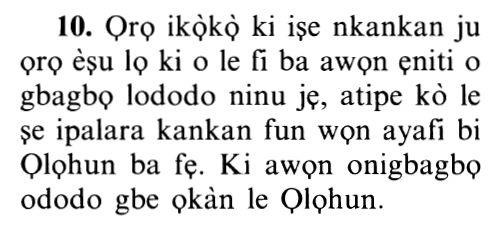58vs10
Select any filter and click on Go! to see results
إِنَّمَا النَّجْوَى مِنَ الشَّيْطَانِ لِيَحْزُنَ الَّذِينَ آمَنُوا وَلَيْسَ بِضَارِّهِمْ شَيْئاً إِلَّا بِإِذْنِ اللَّهِ وَعَلَى اللَّهِ فَلْيَتَوَكَّلِ الْمُؤْمِنُونَ
Innama alnnajwa mina alshshaytani liyahzuna allatheena amanoo walaysa bidarrihim shayan illa biithni Allahi waAAala Allahi falyatawakkali almuminoona
Index Terms
Click to play
Yoruba Translation

Hausa Translation
Gãnãwar daga Shaiɗan take kawai dõmin ya mũnanã wa waɗanda suka yi ĩmãni, alhãli kuwa bã zai iya cũtar su da kõme ba fãce da iznin Allah. Kuma sai mũminai su dogara ga Allah.
Asbabu n-Nuzuul (Occasions of Revelation)
Allah the Exalted said,
إِنَّمَا النَّجْوَى مِنَ الشَّيْطَانِ لِيَحْزُنَ الَّذِينَ آمَنُوا وَلَيْسَ بِضَارِّهِمْ شَيْئًا إِلَّا بِإِذْنِ اللَّهِ وَعَلَى اللَّهِ فَلْيَتَوَكَّلِ الْمُؤْمِنُونَ ﴿١٠﴾
An-Najwa are only from the Shaytan, in order that he may cause grief to the believers. But he cannot harm them in the least, except as Allah permits. And in Allah let the believers put their trust.
Allah states that secret talks, where the believers feel anxious, are مِنَ الشَّيْطَانِ لِيَحْزُنَ الَّذِينَ آمَنُوا (only from Shaytan, in order that he may cause grief to the believers).
meaning, that those who hold such counsels do so because of the lures of the devil, لِيَحْزُنَ الَّذِينَ آمَنُوا (in order that he may cause grief to the believers).
The devil seeks to bother the believers, even though his plots will not harm the believers, except if Allah wills it.
Those who are the subject of evil Najwa, should seek refuge in Allah and put his trust in Him, for none of it will harm them, Allah willing. The Sunnah also forbids the Najwa so that no Muslim is bothered by it.
Imam Ahmad recorded that Abdullah bin Mas`ud said that the Messenger of Allah said,
إِذَا كُنْتُمْ ثَلَاثَةً فَلَا يَتَنَاجَى اثْنَانِ دُونَ صَاحِبِهِمَا، فَإِنَّ ذلِكَ يُحْزِنُه
If you were three, then two of you should not hold a secret counsel in the presence of the third person, because that would cause him to be worried.
This Hadith is collected in the Two Sahihs using a chain of narration that contained Al-A`mash.
Abdur-Razzaq narrated that Abdullah bin Umar said that Allah's Messenger said,
إِذَا كُنْتُمْ ثَلَاثَةً فَلَا يَتَنَاجَى اثْنَانِ دُونَ الثَّالِثِ إِلَّا بِإِذْنِهِ، فَإِنَّ ذلِكَ يُحْزِنُه
If you were three, then two of you should not hold a secret counsel in the presence of the third person, except with his permission, because that would cause him to be worried.
Muslim collected this Hadith.
أي إنما النجوى وهي المسارة حيث يتوهم مؤمن بها سوءا " من الشيطان ليحزن الذين آمنوا " يعني إنما يصدر هذا من المتناجين عن تسويل الشيطان وتزيينه " ليحزن الذين آمنوا" أي ليسوءهم وليس ذلك بضارهم شيئا إلا بإذن الله ومن أحس من ذلك شيئا فليستعذ بالله وليتوكل على الله فإنه لا يضره شيء بإذن الله . وقد وردت السنة بالنهي عن التناجي حيث يكون في ذلك تأذ على مؤمن كما قال الإمام أحمد حدثنا وكيع وأبو معاوية قالا حدثنا الأعمش عن أبي وائل عن عبد الله بن مسعود قال : قال رسول الله صلى الله عليه وسلم " إذا كنتم ثلاثة فلا يتناجى اثنان دون صاحبهما فإن ذلك يحزنه" وأخرجاه من حديث الأعمش . وقال عبد الرزاق أخبرنا معمر عن أيوب عن نافع عن ابن عمر قال : قال رسول الله صلى الله عليه وسلم " إذا كنتم ثلاثة فلا يتناجى اثنان دون الثالث إلا بإذنه فإن ذلك يحزنه " انفرد بإخراجه مسلم عن أبي الربيع وأبي كامل كلاهما عن حماد بن زيد عن أيوب به .
"إنما النجوى" بالإثم ونحوه أي النجوى بالإثم ونحوه "من الشيطان" بغروره "ليحزن الذين آمنوا وليس" هو "بضارهم شيئا إلا بإذن الله" أي إرادته
أي من تزيين الشياطين
I'raab - grammatical analysis of the Qur'an
«إِنَّمَا» كافة ومكفوفة «النَّجْوى » مبتدأ «مِنَ الشَّيْطانِ» خبر المبتدأ والجملة الاسمية تعليل لا محل لها.
«لِيَحْزُنَ» مضارع منصوب بأن مضمرة بعد لام التعليل والمصدر المؤول من أن وما بعدها في محل جر باللام والجار والمجرور متعلقان بمحذوف خبر ثان «الَّذِينَ» مفعول به «آمَنُوا» ماض وفاعله والجملة صلة «وَلَيْسَ» ماض ناقص اسمه مستتر «بِضارِّهِمْ» مجرور لفظا منصوب محلا خبر ليس «شَيْئاً» مفعول به والجملة حال.
«إِلَّا» حرف حصر «بِإِذْنِ» متعلقان بمحذوف حال «اللَّهِ» لفظ الجلالة مضاف إليه. «وَعَلَى اللَّهِ» حرف عطف ومتعلقان بيتوكل «فَلْيَتَوَكَّلِ» الفاء حرف استئناف ومضارع مجزوم بلام الأمر «الْمُؤْمِنُونَ» فاعل والجملة استئنافية لا محل لها
